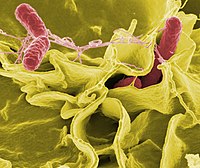
Photo from wikipedia
Multiple antibiotic-resistant extra-intestinal pathogenic Escherichia coli (ExPEC) strains represent a serious health care problem both for poultry and humans. Recently isolates with combined resistance to both antibiotics and heavy metals… Click to show full abstract
Multiple antibiotic-resistant extra-intestinal pathogenic Escherichia coli (ExPEC) strains represent a serious health care problem both for poultry and humans. Recently isolates with combined resistance to both antibiotics and heavy metals have been increased worldwide, with growing concern for possible co-selection of antimicrobial resistant genes. In the present study we characterized, at a phenotypic and genetic level, 80 E. coli isolates: forty independent isolates were collected from manure samples of healthy chickens and 40 from independent human extra-intestinal infections (ExPEC strains). The results obtained indicated that i) compared to chicken, human isolates presented a broader spectrum of antibiotic resistance and virulence potentials; ii) although at a lower extent, ExPEC-associated virulence genes were also present in chicken isolates, suggesting they may be potentially pathogens; iii) that arsenic (As) and zinc (Zn) tolerance genetic determinants were significantly more prevalent among chicken and human isolates respectively, while those responsible for tolerance to cadmium (Cd), silver (Ag) and copper (Cu) were equally distributed among the two groups of strains; iv) a very strong correlation was found between chicken gentamicin (GM) resistance and cadmium (Cd) tolerance. Elucidating the role of heavy metals in the selection and spread of highly pathogenic E. coli strains (co-selection) is of primary importance to lower the potential risk of infections in poultry and humans. The control of bacterial zoonotic agents, that commonly occur in livestock and that may be transmitted, directly or via the food chain, to human populations, could be of relevant interest.
Journal Title: Research in veterinary science
Year Published: 2020
Link to full text (if available)
Share on Social Media: Sign Up to like & get
recommendations!